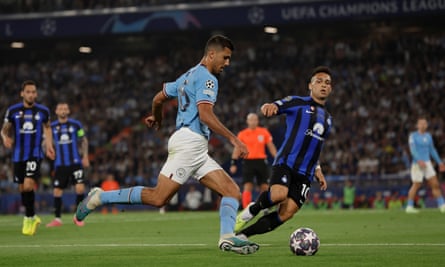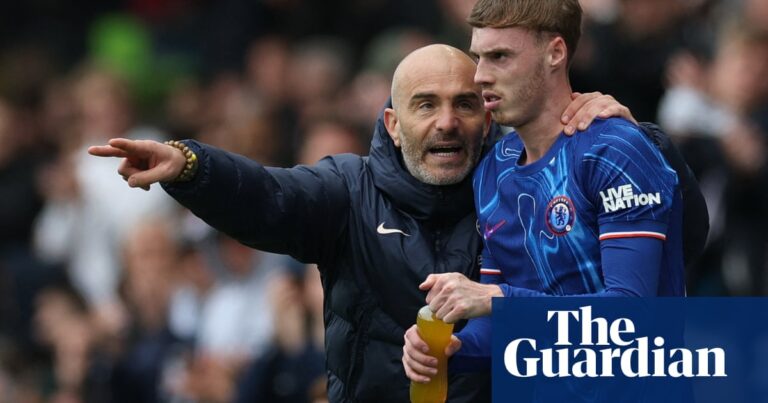There is an argument that for a few years the draw has been the best bit of the group stage of the Champions League. Here they are, the Fates, the sleek besuited former players, smiling and speaking only in corporate banalities, shaping destiny through the medium of miniature plastic footballs and glass bowls.
And there’s the ringmaster, the Italian deputy general secretary of Uefa, Giorgio Marchetti, with his Eurotrivia and unlikely catchphrases, “a very nice draw” and “…according to the established protocols”. His appearance is benign, but then we thought that of his predecessor; could he be plotting a coup to take over world football?
Perhaps the Uefa president Aleksander Ceferin’s decision to make himself part of the show, handing out baubles to Gianluigi Buffon and Cristiano Ronaldo, was an effort to head off that potential threat.
But after the draw came the actual football, the formality of the wealthiest sides going through – other, that is, than those abysmally run. If there has been any uncertainty in the group stage recently, it has been provided by Manchester United and Barcelona. But at least there was some jeopardy – and that appears to have largely been eliminated under the new format. Rather than 96 games to eliminate 16 teams, there are 144 to eliminate nine.
Projections suggest 14-15 points will be needed to finish in the top eight for automatic qualification for the last 16, and eight-nine points to be in the top 24 and secure a playoff spot. Which is to say that after three of their eight games, teams could effectively be through.
This is content production pure and simple, games for the sake of games, the sense of football transformed into entertainment product intensified by the game show dynamic of Ronaldo pushing a large football-styled button to a dramatic clang of music. “Cristiano, Brest v Sturm Graz, is that your final answer?”
There are, it’s true, some games that sound attractive. There’ll be repeats of four of the past five finals as Real Madrid face Borussia Dortmund and Liverpool, Manchester City play Inter and Bayern face Paris Saint-Germain. City meet PSG in a clash of the UAE and Qatar.

There’ll be interest in Bayern v Barcelona, Madrid v Milan, PSG v Atlético, Liverpool v Bayer Leverkusen, Arsenal v PSG and Arsenal v Inter. Liverpool may feel they have the hardest test of the Premier League sides. But the problem is the games feel decontextualised, alienated, deracinated.
These are clashes of the biggest, most glamorous sides in the world. If two European champions face each other and all that is at stake is the difference between finishing fourth and fifth in a preliminary league, has the game really happened at all? Nobody can pretend this is the same as a knockout tie. Given how unlikely it is that any of the biggest sides are going to be in any danger of elimination, it’s not even the same as the group stage, for all its flaws.
Uefa may speak excitedly of more of the big teams facing each other more often, but if they’re in games that don’t really matter, so what?
If anything that is likely to devalue further the currency of clashes between the giants. An excruciating ‘comedy’ sketch insisting the new format is both simple and what people wanted perhaps suggested just how nervous Uefa is about this new direction.
after newsletter promotion
As ever, such interest as there is at this stage is likely to be provided by the sides who have only recently hit the heights, leaving them undervalued by the coefficient system. Given the key players who have left Girona and Bologna from pot 4, that realistically means only Aston Villa and possibly, after finishing second in the Bundesliga last season, Stuttgart.
Villa, on their return to Uefa’s premier competition for the first time since they played as champions 1982-83, could cause problems for Bayern (the team they beat in the 1982 European Cup final), Leipzig and Juventus. Sebastian Hoeness’s side, meanwhile, could be awkward for Madrid, PSG and Atalanta.
The order of the games, which won’t be known until Saturday, could make a difference. But come the final two matchdays in January such drama as there is, beyond a handful of bigger sides squabbling over who gets to avoid the playoffs, it is likely to be a scrap between the lower pot 3 and upper pot 4 sides. Whether the struggle of Young Boys, Celtic, Slovan Bratislava and Monaco to avoid elimination is enough to salvage the tournament is debatable.
As the draw ceremony was at pains to emphasise, in its 70-year history, the tournament has undergone a series of changes of format.
None, though, have done quite so much to dilute the sense of it as a competition, to make it feel like a series of exhibitions. This is increasingly about football less as sport than as business.
Source: theguardian.com


















